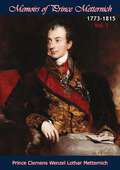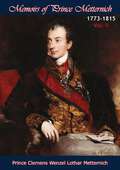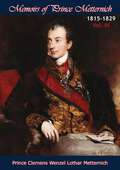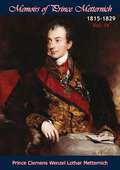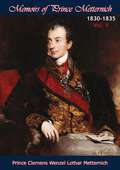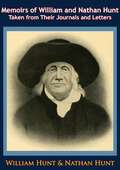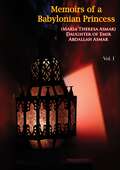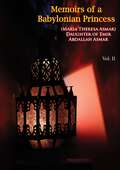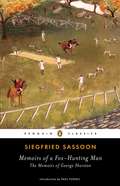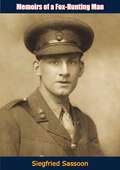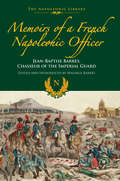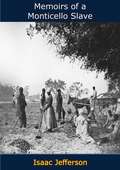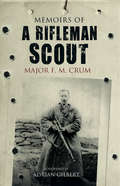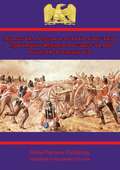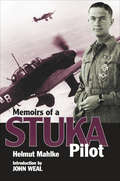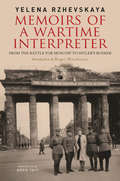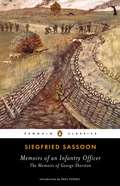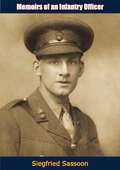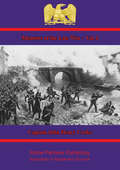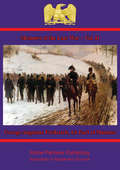- Table View
- List View
Memoirs of Prince Metternich 1773-1815 Vol. I (Memoirs of Prince Metternich #1)
by Prince Clemens Wenzel Lothar MetternichThroughout Prince Metternich's glittering and successful career he sought to free Europe from the forces unleashed by the French Revolution. He was an enemy of change, despised by republicans and feared by radicals. Metternich's acute skill for diplomacy was instrumental in creating alliances to reverse dangerous republicanism and restore Europe's legitimate monarchies to their thrones.-Print ed.English translation of Aus Metternich's nachgelassenen Papieren
Memoirs of Prince Metternich 1773-1815 Vol. II (Memoirs of Prince Metternich #2)
by Prince Clemens Wenzel Lothar MetternichThroughout Prince Metternich's glittering and successful career he sought to free Europe from the forces unleashed by the French Revolution. He was an enemy of change, despised by republicans and feared by radicals. Metternich's acute skill for diplomacy was instrumental in creating alliances to reverse dangerous republicanism and restore Europe's legitimate monarchies to their thrones.-Print ed.English translation of Aus Metternich's nachgelassenen Papieren
Memoirs of Prince Metternich 1815-1829 Vol. III (Memoirs of Prince Metternich #3)
by Prince Clemens Wenzel Lothar MetternichThroughout Prince Metternich's glittering and successful career he sought to free Europe from the forces unleashed by the French Revolution. He was an enemy of change, despised by republicans and feared by radicals. Metternich's acute skill for diplomacy was instrumental in creating alliances to reverse dangerous republicanism and restore Europe's legitimate monarchies to their thrones.-Print ed.English translation of Aus Metternich's nachgelassenen Papieren
Memoirs of Prince Metternich 1815-1829 Vol. IV (Memoirs of Prince Metternich #4)
by Prince Clemens Wenzel Lothar MetternichThroughout Prince Metternich's glittering and successful career he sought to free Europe from the forces unleashed by the French Revolution. He was an enemy of change, despised by republicans and feared by radicals. Metternich's acute skill for diplomacy was instrumental in creating alliances to reverse dangerous republicanism and restore Europe's legitimate monarchies to their thrones.-Print ed.English translation of Aus Metternich's nachgelassenen Papieren
Memoirs of Prince Metternich 1830-1835 Vol. V (Memoirs of Prince Metternich #5)
by Prince Clemens Wenzel Lothar MetternichThroughout Prince Metternich's glittering and successful career he sought to free Europe from the forces unleashed by the French Revolution. He was an enemy of change, despised by republicans and feared by radicals. Metternich's acute skill for diplomacy was instrumental in creating alliances to reverse dangerous republicanism and restore Europe's legitimate monarchies to their thrones.-Print ed.English translation of Aus Metternich's nachgelassenen Papieren
Memoirs of William and Nathan Hunt Taken from Their Journals and Letters
by William Hunt Nathan HuntFamous memoirs of father and son Quaker ministers, who travelled and preachers widely across North America and the World on the precepts and tents of the Friends.Nathan Hunt's family emigrated to what were then the colonies of New Jersey and Pennsylvania between 1670 and 1719. His father, William Hunt, was born in New Jersey and moved to North Carolina about 1752 and was a charter member of New Garden Monthly Meeting in present-day Greensboro when it was organized in 1754. “Nathan was born in 1758 at the family farm about two miles from New Garden Friends Meeting, the third child of Sarah Mills and William Hunt. Nathan said that he "never went to school for more than 6 months in his life." His father died during a missionary trip to England when Nathan was 14, and the family was left almost destitute. Some kindly neighbors arranged for Nathan to apprentice as a blacksmith. Another neighbor, Presbyterian minister Dr. David Caldwell, allowed him to borrow books from his library one at a time, which Nathan read at night after the day's work was done. He had to read by the light of pine knots as candles were scarce and expensive. He later said, "I observed the language of the books and cultivated the habit of using it in my common conversation. The consequence was that I was often taken for a learned man. I spent much of my time in reading the Bible."The land in the Piedmont was still heavily forested, and every community had to provide all of its own goods and services – making clothes, grinding corn, building houses and furniture. Nathan Hunt grew up in this pioneer atmosphere, where every man could handle an axe, and every woman could make butter. There were very few roads, and mail service hardly existed. Cash was scarce, and most stores accepted home-made goods as barter. Clothes were made of flax and wool, both home-grown.”-High Point North Carolina
Memoirs of a Babylonian Princess, (Memoirs of a Babylonian Princess #1)
by Maria Theresa AsmarThe story of a Christian Iraqi woman who was born in Mosul in 1804, as the daughter of a wealthy Emir. Reminiscences of childhood in Baghdad and detailed account of the social, and religious life in Iraq. A superb copy of a rare account of travels through Turkey, Syria, Lebanon, and Palestine. Asmar (1804-c.1870) managed, against tremendous obstacles, to set up a school for women in Baghdad. She then welcomed in western Christian missionaries who promptly bribed the Turkish government to hand over the licence to them and then terminated Asmar's project. Asmar includes lengthy account of her pilgrimage to the Holy places in Palestine, and her visit to Damascus, Palmyra, Beirut, and her service for many years as a companion to the wife of Emir Bashir al-Chehabi at Beit al-Din in Lebanon (including account of Lady Hester Stanhope, a regular visitor to Beit al-Din palace) until her departure for Rome in 1832.-Print ed.
Memoirs of a Babylonian Princess, (Memoirs of a Babylonian Princess #2)
by Maria Theresa Asmar AsmarThe story of a Christian Iraqi woman who was born in Mosul in 1804, as the daughter of a wealthy Emir. Reminiscences of childhood in Baghdad and detailed account of the social, and religious life in Iraq. A superb copy of a rare account of travels through Turkey, Syria, Lebanon, and Palestine. Asmar (1804-c.1870) managed, against tremendous obstacles, to set up a school for women in Baghdad. She then welcomed in western Christian missionaries who promptly bribed the Turkish government to hand over the licence to them and then terminated Asmar's project. Asmar includes lengthy account of her pilgrimage to the Holy places in Palestine, and her visit to Damascus, Palmyra, Beirut, and her service for many years as a companion to the wife of Emir Bashir al-Chehabi at Beit al-Din in Lebanon (including account of Lady Hester Stanhope, a regular visitor to Beit al-Din palace) until her departure for Rome in 1832.-Print ed.
Memoirs of a Fox-Hunting Man
by Siegfried SassoonBritish army officer on the Western Front during WW1 recalls his youth as a rural gentry lad interested only in horses, cricket matches and fox-hunting. A delightful tale of Victorian England which received the Huntington Prize in 1928.
Memoirs of a Fox-Hunting Man (Memoirs of George Sherston #1)
by Siegfried SassoonThis autobiographical novel of the eminent English poet, Siegfried Sassoon was first published in 1927. Memoirs of a Fox-Hunting Man is a fond reminiscence of boyhood and adolescence set against the background of the author’s rural English home. Full of the scent of leather and the huntsman cries on a frosty autumn morning, the scene is set as the world moves slowly towards war.Sassoon’s fluid, sensitive prose, the fine perceptions of the poet is spoken here in the voice of the average man, complete with charm and humor and quiet understatement.A thoroughly enjoyable and memorable read!
Memoirs of a French Napoleonic Officer: Jean-Baptiste Barres, Chasseur of the Imperial Guard (The Napoleonic Library)
by Jean-Baptiste BarresThese lively memoirs date from the time of Barrs entry into the Chasseurs Velites (skirmishers, or light infantry) of Napoleons Imperial Guard in 1804. Always modest in recounting his own exploits, Barrs was not only at the cannons mouth, but also a participant at such spectacular events as the Coronation of the Emperor Napoleon in Paris and Rome, the torch light procession on the eve of Austerlitz, the meeting of the two Emperors at Tilsit, and the magnificent military display in the Champ de Mars. His duties involved mounting guard at Malmaison and the palace of Saint-Cloud and also allowed him many fascinating glimpses of the Emperor at reviews, presenting awards and receiving trophies.This is a superb record of a serving soldier, making light of danger, sharing with the reader the fatigues and privations that attended so much campaigning in appalling weather and hostile country, and rejoicing as much in the outcome of a successful foraging expedition as his promotions and appointment as Chevalier de la Lgion dhonneur.
Memoirs of a Monticello Slave: As Dictated to Charles Campbell in the 1840’s by Isaac, One of Thomas Jefferson’s Slaves
by Isaac JeffersonThis book, first published in its present form 1951, is a collection of reminiscences by Isaac Jefferson, a tinsmith, blacksmith, and nailer at Monticello, and valued, enslaved artisan of U.S. President Thomas Jefferson. In the 1840 census he was recorded as Isaac Granger, a free man working in Petersburg, Virginia, and it was there that the Rev. Charles Campbell interviewed him and went on to publish his memoirs under the name of Isaac Jefferson in 1847.
Memoirs of a Rifleman Scout
by F. M. CrumFrederick Maurice Crum (18791952) fought in the Second Boer War (18991902) in the Mounted Infantry, where he was wounded and taken prisoner. After peacetime service in India he retired due to the effects of his injuries, and became involved in the Boy Scout movement, founding the 7th Troop of Boy Scouts at Stirling in Scotland in 1909. On the outbreak of war in 1914 he rejoined the Rifle Corps and served with its 8th Battalion in France until 1919, specialising in trench sniping.Made up from his extensive diaries and letters to family and friends at the time, this book details the development of sniping in the British Army in the First World War. It was through the work of expert marksmen and trainers like Major Crum that the initial dominance of the Germans in this type of fighting was eventually overcome. These memoirs provide a unique insight into the life of a British Army officer before and during the First World War. Major Crum's involvement in the Boy Scout movement is also a fascinating account of that organisation's origins, showing what the true motives behind its foundation were.With a new Foreword by sniping expert Adrian Gilbert, this is not only a first-rate memoir of sniping in the trenches, but also of a long, outstanding life of bravery
Memoirs of a Sergeant in the 43rd Light Infantry in the Peninsular War
by AnonIn this anonymously published memoir, the experiences of a "light-bob", or light infantryman, are recounted in a readable and exciting account. The Author reveals himself to be a proud Irishman who joined the 43rd in time to join the expedition to Denmark, before embarking on more serious skirmishing and heavy fighting in the Peninsular. First during Sir John Moore's retreat to Coruña and then as part of the famed Light Division under General Craufurd. His view of the actions on the Coa, Masséna's invasion of Portugal, the battle of Fuentes d'Oñoro, the siege of Ciudad Rodrigo follow before his wounds at the storming of Badajoz force his retirement.The author gives an excellent account of the day-to-day life as an N.C.O. in the light infantry, tactics and experience recounted in detail, along with the impact on the Portuguese and Spanish civilians that he encounters.An enjoyable Peninsular read.Author -- AnonText taken, whole and complete, from the edition published in 1835, London, by John Mason.Original Page Count - 278 pages.
Memoirs of a Stuka Pilot
by Helmut Mahlke&“Well-written and holds the reader&’s attention . . . an engaging book and a rare personal view of flying one of the most iconic aircraft of WWII.&” —Firetrench After recounting his early days as a naval cadet, including a voyage to the Far East aboard the cruiser Köln and as the navigator/observer of the floatplane carried by the pocket battleship Admiral Scheer during the Spanish Civil War, Helmut Mahlke describes his flying training as a Stuka pilot. The author&’s naval dive-bomber Gruppe was incorporated into the Luftwaffe upon the outbreak of war. What follows is a fascinating Stuka pilot&’s-eye view of some of the most famous and historic battles and campaigns of the early war years: the Blitzkrieg in France, Dunkirk, the Battle of Britain, the bombing of Malta, North Africa, Tobruk, and Crete, and, finally, the invasion of the Soviet Union. Mahlke also takes the reader behind the scenes into the day-to-day life of his unit and brings the members of his Gruppe to vivid life, describing their off-duty antics and mourning their losses in action. The story ends when he himself is shot down in flames by a Soviet fighter and is severely burned. He was to spend the remainder of the war in various staff appointments. &“An engaging, engrossing and exceptionally informative book. A worthy addition to any military enthusiast&’s library and is unhesitatingly and heartily recommended.&” —Aviation History
Memoirs of a Wartime Interpreter: From the Battle for Moscow to Hitler's Bunker
by Yelena Rzhevskaya"By the will of fate I came to play a part in not letting Hitler achieve his final goal of disappearing and turning into a myth I managed to prevent Stalins dark and murky ambition from taking root his desire to hide from the world that we had found Hitlers corpse" - Elena Rzhevskaya"A telling reminder of the jealousy and rivalries that split the Allies even in their hour of victory, and foreshadowed the Cold War"- Tom Parfitt, The GuardianOn May 2,1945, Red Army soldiers broke into Hitlers bunker. Rzhevskaya, a young military interpreter, was with them. Almost accidentally the Soviet military found the charred remains of Hitler and Eva Braun. They also found key documents: Bormann's notes, the diaries of Goebbels and letters of Magda Goebbels.Rzhevskaya was entrusted with the proof of the Hitlers death: his teeth wrenched from his corpse by a pathologist hours earlier. The teeth were given to Rzhevskaya because they believed male agents were more likely to get drunk on Victory Day, blurt out the secret and lose the evidence. She interrogated Hitler's dentist's assistant who confirmed the teeth were his.Elenas role as an interpreter allowed her to forge a link between the Soviet troops and the Germans. She also witnessed the civilian tragedy perpetrated by the Soviets. The book includes her diary material and later additions, including conversations with Zhukov, letters of pathologist Shkaravsky, who led the autopsy, and a new Preface written by Rzhevskaya for the English language edition.Rzhevskaya writes about the key historical events and everyday life in her own inimitable style. She talks in depth of human suffering, of bittersweet victory, of an author's responsibility, of strange laws of memory and unresolved feeling of guilt.
Memoirs of an Infantry Officer
by Paul Fussell Siegfried SassoonPersonal narratives of a British officer on the Western front during World War I. Copyright © Libri GmbH. All rights reserved.
Memoirs of an Infantry Officer (Memoirs of George Sherston #2)
by Siegfried SassoonThis autobiographical novel of the eminent English poet, Siegfried Sassoon was first published in 1930. The Memoirs of an Infantry Office, widely considered a classic among war books, tells of the author’s steady disillusionment with the Army—and of his ultimate rebellion against the cruel realities of war.Sassoon’s fluid, sensitive prose, the fine perceptions of the poet is spoken here in the voice of the average man. With charm and humor and quiet understatement, he has managed to articulate the hidden feelings of any sensitive man who in the normal course of his life is suddenly exposed to the nightmare of war.An unforgettable read.
Memoirs of the Late War – Vol. I. (Memoirs of the Late War #1)
by Captain John Henry CookeThis ebook is purpose built and is proof-read and re-type set from the original to provide an outstanding experience of reflowing text for an ebook reader.An anthology of memoirs of the Peninsular War and the abortive attack on Bergen-op-Zoom in 1814. This second volume includes two accounts from either end (chronologically) of Captain Cooke's narrative on the initial campaign into Spain in 1809 under the Duke of Wellington, recounted by the Earl of Munster. It also recounts the disastrous night attack on Bergen-op-Zoom by the British troops under Lord Lynedoch by Lieutenant Moodie, in which he leaves out none of the horrific carnage of the bungling coup de main. Title - Memoirs of the Late War - Vol. II Sub-Title - Series Name - Memoirs of the Late War Series Number --2 Authors -- Captain John Henry Cooke (????-????); George Augustus Frederick, 1st Earl of Munster (1794-1842); Lieutenant John W. D. Moodie (1789-1815) Text taken, whole and complete, from the edition published in 1831, London, by Henry Colbourn and Richard Bentley. Original - 321 pages.
Memoirs of the Late War – Vol. II. (Memoirs of the Late War #2)
by George Augustus Frederick, 1st Earl of MunsterThis ebook is purpose built and is proof-read and re-type set from the original to provide an outstanding experience of reflowing text for an ebook reader. An anthology of memoirs of the Peninsular War and the abortive attack on Bergen-op-Zoom in 1814. In this first volume, Captain Cooke recounts his experiences with the 43rd Foot at Ciudad Rodrigo, Badajoz, the battles of Salamanca, Vittoria, the Pyrenees, the Bidassoa, the Nive, Nivelle and Toulouse. As with many of the British officer memoirs, there is a tone of dry wit about his writing. Title - Memoirs of the Late War - Vol. I Sub-Title - Series Name - Memoirs of the Late War Series Number --1 Authors -- Captain John Henry Cooke (????-????); George Augustus Frederick, 1st Earl of Munster (1794-1842); Lieutenant John W. D. Moodie (1789-1815) Text taken, whole and complete, from the edition published in 1831, London, by Henry Colbourn and Richard Bentley. Original - 321 pages.
